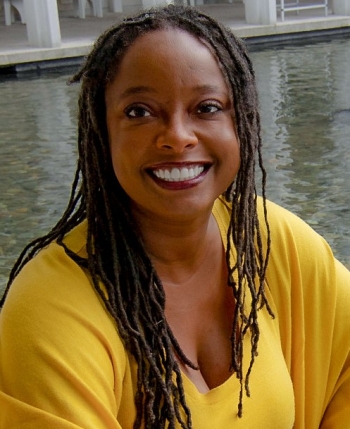Lekelia Jenkins, an associate professor in the School for the Future of Innovation in Society at Arizona State University, has always worked in what she calls “neglected spaces” — where the line of conservation workers is the thinnest, but the need is greatest. Gathering support and solutions in these spaces is where she excels, but the nature of this work means she is never in the same place for long.
While Jenkins often isn’t present to see the outcomes of her work, she knows it has value to the communities she serves, especially in regard to involvement in sustainable fisheries and marine renewable energy. Her efforts have led to regulatory changes for more sustainable fisheries, advised international fisheries diplomacy and informed energy policy. She is not alone in recognising this value: The International Science Council (ISC) recently named Jenkins a 2023 ISC Fellow, the highest honor that can be conferred on an individual by the council.
“When you move from place to place the way I do,” Jenkins said, “you aren’t looking for recognition. You plant the seeds, but don’t see the flowers grow. To be recognized by the ISC like this is really rewarding and really affirming.”
Jenkins, also a senior global futures scientist with the Julie Ann Wrigley Global Futures Laboratory, is among 100 new fellows to join this international cohort, a group made up of scientists, engineers and thought leaders who have made impactful contributions to science and society.
Among the fellows are esteemed scientists and leaders such as former president of Ireland and noted human rights advocate Mary Robinson (as an honorary fellow), Johan Rockström and Mohammed Hassan; these leaders are united not only in their ISC fellowship, but also their recent collaboration on the 2023 Global Futures Conference that was hosted and presented by the Julie Ann Wrigley Global Futures Laboratory.
Jenkins’ recent work has taken her across the globe, where she worked with fisheries in Australia as a Fulbright Scholar. Recently, she has helped galvanize the U.S. National Academy of Sciences to conduct a consensus study on diversity, equity and inclusion in the ocean studies community.
“We are very excited with this important appointment and proud to have Dr. Jenkins in our faculty,” said Eusebio Scornavacca, interim director of the School for the Future of Innovation in Society, which is part of the College of Global Futures. “This is a recognition of her important contributions in bringing in societal dimensions to marine conservation.”
Jenkins said her appointment as a fellow came at a great time: She had recently had a conversation with a friend about joy, and what they hoped would bring them joy in the next 15 years of their careers.
“Being selected as an ISC Fellow really is a symbol for exactly what we were talking about because I find great joy in my work when it makes a tangible improvement in people’s lives,” Jenkins said. “A community of other scientists recognizing the work I do has value, and it shows communities that I work with that the work I do is serving the public good.”
Jenkins works in the human spaces of marine conservation, which gives her a unique perspective on the people behind the science. As an African American woman with an invisible disability who works in the Global South, she said she has seen firsthand the importance and necessity of making ocean sciences equitable and inclusive. This experience has driven her to serve on national diversity advisory boards and found groups, organize events and lead workshops to advance women and people of color in STEM.
“Part of the ISC’s vision is that the practice of science must be inclusive and equitable,” Jenkins said. “The work I do recognizes that yes — we're a global community — but we're a global community with sub-communities that all have individual needs.”
Fellows are chosen by the ISC’s fellowship council for their dedication to furthering understanding of and engagement with science, in addition to demonstrating the ISC’s mission to be “a voice for science.”
"The ISC Fellowship recognizes individuals who are ambassadors and advocates working tirelessly for science internationally and for the vital importance of evidence-informed policymaking,” Terrence Forrester, chair of the fellowship council, said in a news release. “ISC Fellows hail from wide-ranging geographies, sectors, disciplines and career stages, and we look forward to working with them all in multiple capacities in the coming months and years."
More University news

ASU community exceeds goal, raises $835K for Valley of the Sun United Way
The Arizona State University community stepped up and raised over $835,266 for the Valley of the Sun United Way — exceeding the $800,000 goal for 2024.Of the total, $802,192.17 was raised through…

ASU launches online ocean futures undergraduate degrees
Our oceans make up three quarters of the planet’s surface and contain most of its biodiversity. Due to rapid and global changes, they are endangered — making more urgent a deeper knowledge of ocean…

ASU public affairs graduate programs rise to No. 11 in nation in US News & World Report’s 2025 rankings
Arizona State University rose to No. 11 nationwide for best graduate public affairs programs in U.S. News & World Report’s 2025 rankings, the magazine announced.The ranking, released April 8,…


